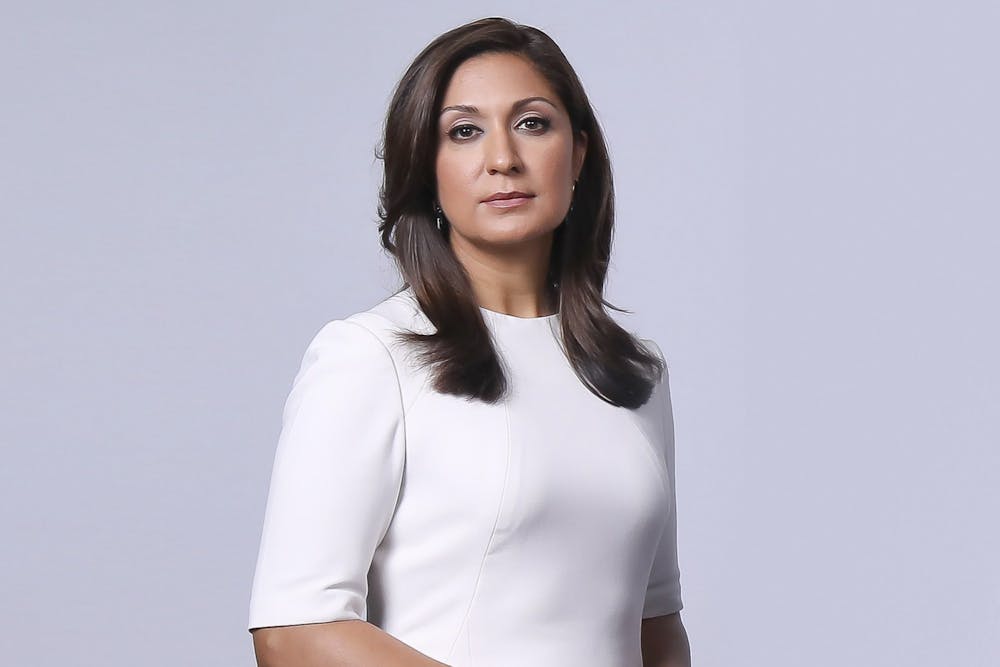On Jan. 14, the Democratic presidential candidates participated in the latest debate in Iowa. And in the last debate of 2019, Penn graduate Amna Nawaz made history as one of the debate moderators.
In the aftermath of the most recent Democratic debate, take a look at the 2001 College graduate's journey from Penn to PBS. From covering the United States raid on Osama bin Laden's compound at NBC to making history as the first Asian American person to moderate a presidential debate, Nawaz is currently one of the most prominent Penn alumni in broadcast journalism.
1. Nawaz currently serves as the senior national correspondent at PBS NewsHour.
This year, Nawaz spent time reporting on the migrant crisis from border towns in the United States, Mexico, and Central America.
“I think that there are some very important big questions being asked right now about who we are as a country, and we get to tell them in very small, slice-of-life ways in moments in time in particular places,” Nawaz told The Daily Pennsylvanian.
Before PBS, Nawaz covered politics and anchored all live stream coverage at ABC for the 2016 election. She has also led projects such as ‘The Plastic Problem’ following the global environmental crisis of plastic and the ‘Broken Justice’ podcast on the state of America’s justice system. Her 2009 NBC News Special “Inside the Obama White House” won an Emmy award in the Outstanding Original Interactive Program category in 2017.
“I travel the world and the country reporting on a lot of things that are really at the heart of what’s driving people’s decisions when it comes to how they vote,” she said. “It’s incredibly inspiring and it’s an incredible recharging moment to be able to get out and to be in people’s homes and have them confide in you.”
2. She is the first Asian American and first Muslim person to moderate a presidential debate.
RELATED:
Cenk Uygur, Wharton graduate and progressive media mogul, is running for Congress
House impeaches President and 1968 Wharton graduate Donald Trump
“I think it’s fair to say that it weighed very heavily on me just in terms of the responsibility that I feel, but none of that changes how I do my job,” Nawaz said.
Colleagues from PBC NewsHour and Politico joined Nawaz on the Los Angeles debate stage in December.
She received a flurry of supportive messages, especially from those who identified with her cultural and religious background.
“I don’t think a lot of people would have expected to see that in their lifetimes," she added. “I know what it would have meant to me growing up to see someone like me in some of those faces, and I didn’t have that."
3. She said prepping for the debate felt like cramming for a final.
“Preparation is like, imagine cramming for one of the biggest finals at the end of the year, but starting way earlier than you usually do,” Nawaz said. “It is an intense and involved process that involves way more people than most people probably expect.”
Nawaz worked with her colleagues from PBS and Politico to streamline different ideas down to important questions related to the most pressing issues on voters’ minds. Her own questions for the 2020 Presidential candidates tackled topics including immigration reform, financial compensation for vulnerable populations, and race in America.
“We tried to really channel our audience and the people that we know turn to us all the time for our news and say, ‘Okay, what do we think really matters to them? What are the issues on top of their minds? What do we hear again and again from people when we’re out in the field reporting that they want answers to?’" she said. “And eventually, you come up with a list of questions and you don’t even get to ask all of them in the actual debate because two hours is not a lot of time and it does fly by."
4. While at Penn, she planned to be a lawyer and captained the Varsity Field Hockey Team.
Nawaz majored in Philosophy, Politics, and Economics and was not a part of The Daily Pennsylvanian (“I never did the DP and that is my failure.”), but spent a semester abroad in Zimbabwe during her junior year.
Nawaz intended to become a lawyer but instead dove headfirst into journalism after witnessing the 9/11 attacks mere months after beginning a fellowship at ABC Nightline.
“I was a young, brown, Muslim-American trying to figure out her place in the world at a time when this country was trying to figure out its place in the world,” Nawaz said. “And what I found in journalism, and working with the best journalists of the time in the industry, was that facts and searching for information that you can say is undeniably, provably, true, gave me direction.”
5. She has a plea for Penn students.
Nawaz said she recognizes the pressure many Penn students face after graduation to meet familial expectations or follow a traditional career path but implores them to consider journalism.
“If I can make a plea to all those incredibly smart Penn grads out there, to look at journalism and to consider your place not just in this country, but in the world in terms of the impact you can have by helping to write the story of this time in American history," she said. “It’s a pretty cool job.”









